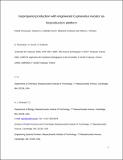Isopropanol production with engineered Cupriavidus necator as bioproduction platform
Author(s)
Grousseau, Estelle; Lu, Jingnan; Gorret, Nathalie; Guillouet, Stéphane E.; Sinskey, Anthony J
Download253_2014_5591_ReferencePDF.pdf (1.382Mb)
OPEN_ACCESS_POLICY
Open Access Policy
Creative Commons Attribution-Noncommercial-Share Alike
Terms of use
Metadata
Show full item recordAbstract
Alleviating our society’s dependence on petroleum-based chemicals has been highly emphasized due to fossil fuel shortages and increasing greenhouse gas emissions. Isopropanol is a molecule of high potential to replace some petroleum-based chemicals, which can be produced through biological platforms from renewable waste carbon streams such as carbohydrates, fatty acids, or CO2. In this study, for the first time, the heterologous expression of engineered isopropanol pathways were evaluated in a Cupriavidus necator strain Re2133, which was incapable of producing poly-3-hydroxybutyrate [P(3HB)]. These synthetic production pathways were rationally designed through codon optimization, gene placement, and gene dosage in order to efficiently divert carbon flow from P(3HB) precursors toward isopropanol. Among the constructed pathways, Re2133/pEG7c overexpressing native C. necator genes encoding a β-ketothiolase, a CoA-transferase, and codon-optimized Clostridium genes encoding an acetoacetate decarboxylase and an alcohol dehydrogenase produced up to 3.44 g l[superscript -1] isopropanol in batch culture, from fructose as a sole carbon source, with only 0.82 g l[superscript -1] of biomass. The intrinsic performance of this strain (maximum specific production rate 0.093 g g[superscript -1] h[superscript -1], yield 0.32 Cmole Cmole[superscript -1]) corresponded to more than 60 % of the respective theoretical performance. Moreover, the overall isopropanol production yield (0.24 Cmole Cmole[superscript -1]) and the overall specific productivity (0.044 g g[superscript -1] h[superscript -1]) were higher than the values reported in the literature to date for heterologously engineered isopropanol production strains in batch culture. Strain Re2133/pEG7c presents good potential for scale-up production of isopropanol from various substrates in high cell density cultures.
Date issued
2014-03Department
Harvard University--MIT Division of Health Sciences and Technology; Massachusetts Institute of Technology. Department of Biology; Massachusetts Institute of Technology. Department of Chemistry; Massachusetts Institute of Technology. Engineering Systems DivisionJournal
Applied Microbiology and Biotechnology
Publisher
Springer Berlin Heidelberg
Citation
Grousseau, Estelle, Jingnan Lu, Nathalie Gorret, Stéphane E. Guillouet, and Anthony J. Sinskey. “Isopropanol Production with Engineered Cupriavidus Necator as Bioproduction Platform.” Applied Microbiology and Biotechnology 98, no. 9 (March 7, 2014): 4277–4290.
Version: Author's final manuscript
ISSN
0175-7598
1432-0614